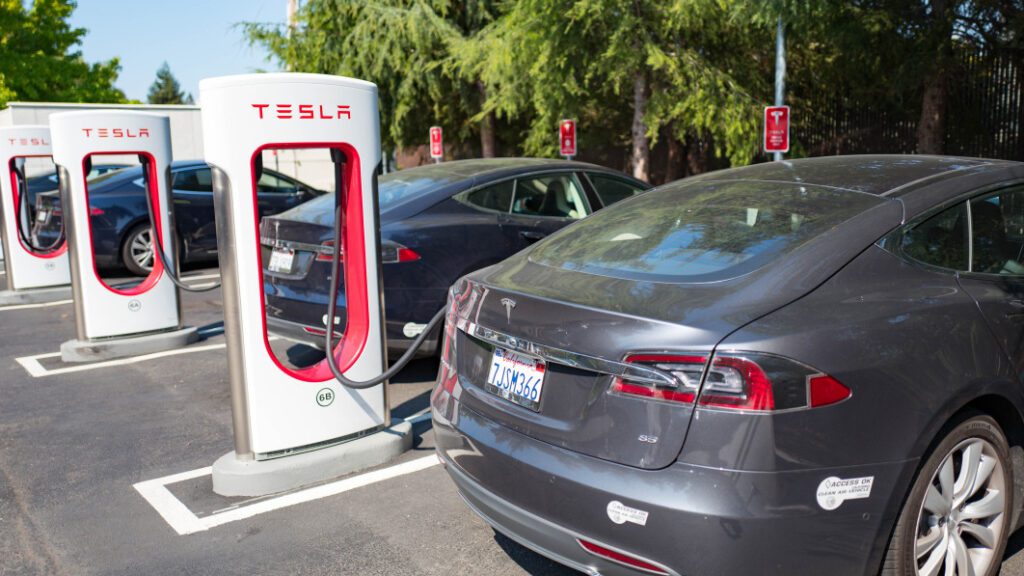Tesla lost $140 billion in market value in under a month, faces these mounting troubles

Tesla’s share price has plunged in April, wiping out around $140 billion worth of market capitalization.
Smith Collection/Gado/Getty Images
Tesla’s share price plunged this month, wiping out over $140 billion in market capitalization.
Aggressive price cuts have eaten into the EV maker’s profits, and Q1 sales fell short of some estimates despite the discounts.
Here’s everything you need to know about the latest fluctuations in Tesla’s fortunes.
This has been a cruel month for Tesla.
The EV maker has shed more than a fifth of its overall valuation in the past 26 days, with its share price plunging on disappointing first-quarter delivery and profit numbers.
Wall Street’s top analysts have turned cautious on the tech giant – and the selloff has likely wiped out some of CEO Elon Musk’s own personal fortune.
Here’s what you need to know.
What happened?
Tesla shares have plummeted 22% in under a month, dropping from over $207 on March 31 to the $160.67 level they traded at when markets closed Tuesday.
That means the stock is significantly lagging the tech-heavy Nasdaq Composite index, which slipped just 2% in April, and the benchmark S&P 500, which has traded roughly level over the same period.
The EV maker’s stock plunge has wiped out about $143 billion in value for investors, with its total market capitalization plunging to $513 billion from $657 billion at the end of last month.
Meta Platforms has eclipsed Tesla to become the world’s eighth-largest publicly-listed company due to those losses – while surging French luxury goods provider LVMH is hot on the EV maker’s heels, having become the first European firm to reach the $500 billion market cap milestone this week.
What drove the stock slide?
Tesla has slashed car prices six times in 2023 – meaning that the entry-level Model 3 now costs less than $40,000, down from $62,990 at the start of the year, while the Model S and Model X are also 20% cheaper than they were on January 1.
Following the aggressive cuts, the company’s first-quarter deliveries hit a record but still fell short of some Wall Street estimates. And some analysts are taking that as a sign that the price war isn’t stoking demand fast enough to offset the effects of a faltering global economy.
Shares fell as much as 7% on April 3 after Tesla released the sales numbers, which showed it had produced around 17,000 more vehicles than it had delivered in the three months ended March 31. Data showing a slowdown in China’s car market, the world’s biggest, has also weighed on investor sentiment toward Musk’s firm.
The stock then plunged another 10% last Thursday after the EV maker released a disappointing first-quarter earnings report, which showed profits plummeting 24% year-on-year.
Tesla has also raised its internal spending forecasts – which some investors took as confirmation that Musk’s aggressive price cuts have and will continue to eat away at the company’s margins.
How does Wall Street view Tesla?
Falling margins are to be expected when a company cuts prices aggressively in a bid to boost its market share – but analysts weren’t anticipating a 24% plunge in Tesla’s profits.
“The extent of margin declines was below what I was expecting and what the market was expecting too,” Morningstar equity analyst Seth Goldstein told Insider last week. “That’s why we saw the stock sell-off. It was a reaction to that.”
Some strategists slashed their Tesla price targets after its disappointing earnings – including New Constructs CEO David Trainer, who made the eye-popping prediction that shares will crash another 83% from current levels to just $28.
But others believe it’s too soon to know how Musk’s price war will play out – with there still being a possibility that cheaper Teslas draw customers away from both legacy automakers and upstart EV rivals.
“Right now, it looks like the company’s competitive position is being prioritized over protecting profitability,” AJ Bell investment director Russ Mould said Thursday. “Only time will tell if that is the right move.”
How does the selloff impact Elon Musk?
The world’s second-richest man derives much of his wealth from stakes in Tesla and SpaceX – so the EV maker’s share slump has delivered a sizeable blow to his own personal fortune.
Musk’s net worth has slumped to $164 billion from $187 billion at the end of March, according to Bloomberg’s Billionaires Index – meaning he’s lost $23 billion in under a month.
But Musk signaled on Tesla’s earnings call last week that he’d press ahead with price cuts in a bid to sell more cars, even if the strategy has already cost the company on Wall Street and hit his own net worth.
“We’ve taken a view that pushing for higher volumes and a larger fleet is the right choice here versus a lower volume and a higher margin,” he said.



